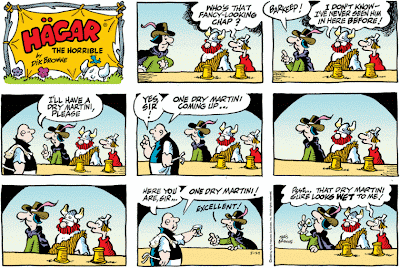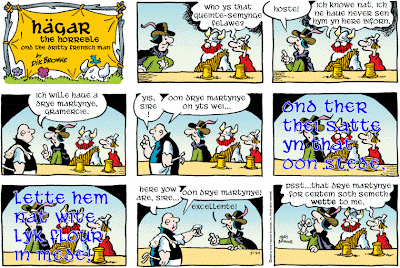For the last three hundred years,** Jeff's daughter Adrian has been head-over-heels in love with a con man named Ted. Adrian, please note, is a doctor and therefore not a stupid woman; her brains did not stop her from advancing Ted a wad of cash and helplessly bewailing her fate when he subsequently tried to skip town. Luckily, big strong Detective Scott Hewlett came to her rescue. She was wary about trusting him at first, but now that her father has spent seven freaking strips in a row*** gushing about how he knew and adored Scott's father, Adrian seems to have decided that it's okay to fall for the guy. Today, she time-travels back to the 1950s, or possibly the 1350s, as Scott gallantly pays for her meal and sweeps her off her feet with his manly refusal to let her think for herself.
The medieval aspects of the comic are pretty clear. The first, of course, is the fact that a bloody goddamned doctor is apparently incapable of doing anything for herself without her father's approval or the help of her current lover. The only bit of the strip that doesn't fit is the fact that Adrian is a doctor.**** Otherwise, we may as well be back in the days when men were men and women were treated like right idiots.
My latest theory is that newspaper comics are, in fact, a time machine for our brains. Slowly, irrevocably, they are dragging us back into the past, simply by attempting to convince us that nothing has changed since the late fourteenth century. When everybody stops using forks and bathing, we'll know what's going on.


P.S.: "Madrian" is ginger treated with lye, as well as possibly an amusing name for Saint Adrian. I have appropriated it.
*Well, no, but I could possibly refrain from stabbing them for a minute or two.
**Or, in Mary Worth time, ten minutes.
***Or, in Mary Worth time, ten seconds.
****I am sure, however, that when she marries Scott, she will give up odious work and start doing what women do best: nagging, putting on weight, popping out babies, and ending up bitter and emotionally isolated.










































